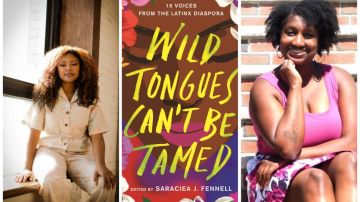‘Wild Tongues Can’t Be Tamed’ is a Powerful Anthology of Diverse Latinx Voices
Latinx stories aren’t often represented in the mostly white publishing industry so the newly-released anthology Wild Tongues Can’t Be Tamed, edited by Saraciea J

Courtesy of Flatiron Books/Viscose Illusion/Sharon N. Clarke
Latinx stories aren’t often represented in the mostly white publishing industry so the newly-released anthology Wild Tongues Can’t Be Tamed, edited by Saraciea J. Fennell, who is of Black, Indigenous, and Honduran woman, is a powerful book simply by existing. Featuring stories by 15 Latinx writers including Ingrid Rojas Contreras, Natasha Diaz, and Elizabeth Acevedo, the anthology highlights the Latinx diaspora which, in the U.S., includes people from 33 countries in Latin America. The title was inspired by Chicana writer Gloria Anzaldúa’s Borderlands/La Frontera as Fennell writes in the introduction, “We are letting our truths run wild, and pushing against whatever it is you think is the ideal Latinx individual.” Much like that book, Wild Tongues explores what it’s like to live in the in-between as Latinxs in the U.S. never quite fitting into either world. Fennell intentionally included established Latinx writers along with lesser known writers to include an array of voices to showcase the diversity within the diaspora.
“I got to edit greats like Meg Medina, Elizabeth Acevedo, Ibi Zoboi, Naima Coster and more more, who wouldn’t love that? I knew right from the very beginning that I wanted to center voices from the diaspora that are usually looked over, so it’s no secret I wanted to highlight Black, Indigenous, and Queer voices. The hardest part during the selection process was narrowing the writers to include in this nonfiction collection,” she tells HipLatina.
Fennell also has her own story in the book, “Half In, Half Out” that revolves around her own evolution in understanding her roots after a stint in foster care in a white neighborhood in a more affluent part of Brooklyn. She writes about navigating the world as a Black Latina and constantly being questioned about her identity, even being misidentified as Puerto Rican by her cousin at one point.
https://www.instagram.com/p/CVgldjjL-P7/
“I decided to write ‘Half In, Half Out’ because I thought it was a pivotal moment in my life where everything changed. It’s where I found myself in new environments, engaging with white people, other people of color who all were digging into me about my hair, my skin color, and asking the million dollar question ‘who was I and where did I come from?'” she says. “It was important for me to tell this story, because I want readers to know that it’s okay to not have all the answers, but we should never stop seeking the truth, whether that’s within our family and close-knit communities or in the world at large.”
The stories within this book all seem to carry the same intention of validating our experiences and also calling out some of the uglier, harder realities that we sometimes deal with in the dark. In “More than Nervios”, by Bronx-born Puerto Rican young adult author Lilliam Rivera talks about her struggles with depression, suicide ideation, and seeking help. She writes, “Self-love is no longer a luxury meant only for a privileged few. I am trying to save my life everyday. I value it too much to not try.”
Mental health remains stigmatized in the Latinx communities keeping men and women from seeking the help they need. Rivera includes a statistic from the American Association of Suicidology that Latinas have had the highest rates of depressive symptoms and suicides rates in over 30 years, yet only one in 11 seek treatment.
“I think it’s imperative that we dig deeper into the conversations being had on what it means to be Latine/Latinx. My essay is about suicide ideation, a topic somethings considered taboo in our community. But whether you are Latine or not, everyone can connect to the raw and truthful essays in the anthology,” Rivera tells HipLatina.
Dominican writer Jasminne Mendez also tackled a taboo topic, writing about racism within the theatre world. In “Alaiyo” written in three acts broken up by her own experiences she calls out the racist behavior she endured while in theatre at school. She writes how she was often overlooked for leading roles because she “didn’t fit the part” though, she explains, it felt like it was more about her skin tone than acting skills.
“Writing about this topic was important to me because, until recently, most people in the theatrical world didn’t like to or didn’t want to face the fact of how racist and unjust the theater world actually is. It was important for me to call out and name the traumatic and unjust experiences that I faced specifically while in high school and college,” she tells HipLatina. Because back then we simply brushed them off and joked about them. But as an adult I can see how damaging so many of those instances and situations actually were.”
She writes about petitioning the theater department at the University of Houston to develop a production of A Raisin in the Sun about a Black family in Chicago, which is the play that sparked her love of theatre and also what the title of the story references (it means “one for whom bread is not enough”). She played Ruth Younger. which turned out to be a powerful and emotional role for her.
“I also wanted to show that when given the right part and when allowed to tell the stories of people who looked like me and had lived a life like mine that is when I truly excelled and felt like the theater was home and I think that if more people realize and see that the more they’ll realize and know how necessary it is for our stories to be out in the world in various formats whether that’s in writing or on the stage or on TV.”
The issue of identity is prominent in multiple stories including “Eres un Pocho” by Mark Oshiro, who is of Mexican, Guatemalan, and Salvadoreño descent, “Haitian Sensation” by Ibi Zoboi, and “Abuela Greatest Gift” by Garifuna writer Janel Martinez. In “Cuban Impostor Syndrome”, Zakiya N.Jamal explores anti-Blackness and feeling ostracized by the Latinx community. She shares with HipLatina that the title was inspired by her sense of impostor syndrome while writing the essay feeling like people might not care about what a “second generation Cuban American who can’t even speak Spanish had to say about the Latinx experience.” She shares in the story her evolution in understanding her roots and how colorism means Afro-Latinidad is a complicated identity.
“I’m glad I wrote it because I do hope someone who worries they’re not ‘Latinx enough’ realizes there is no one way to be Latinx. All of our experiences are different and valid and we all deserve to tell our stories.”
This sentiment is one seemingly all the contributors share and what makes the book that much more powerful. The writers are telling the stories they wish they had growing up and paving the way for more representation in publishing. According to a 2019 Diversity Report in Publishing from Lee & Low Books found that overall, 76 percent of people in the publishing industry identify as White and only six percent identify as Latinx and five percent identify as Black/Afro-Caribbean. There is still a long way to go but a book for and by Latinx of all skin tones and backgrounds is a huge sign of progress and just the beginning.
“I never saw this type of representation before, so I hope my essay paves a path for other Black Honduran and Indigenous writers like myself. The canon has room for our stories despite what some people believe. I want readers who connect with my story to let their truth run wild. We are so conditioned to hide away parts of ourselves, and I want us to dismantle that, we shouldn’t have to make our existence more palatable for society, instead be free in whatever capacity you can allow yourself to be,” Fennell says.

















